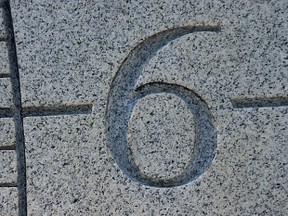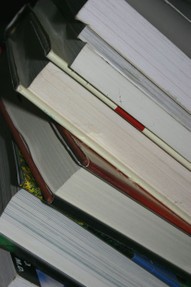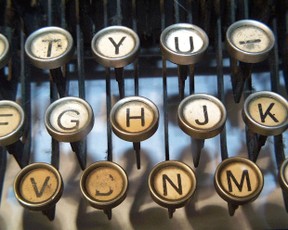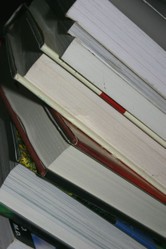 There are, of course, any number of ways to start a work of fiction, and you might have an opener that doesn't conform to any of these.
There are, of course, any number of ways to start a work of fiction, and you might have an opener that doesn't conform to any of these.
However, as a rule of thumb, there are, typically, six ways in which to write the first line of a novel.
1, Scene setting - What I mean by scene setting is standard information that helps establish the time, location and/or climate of the story. A good example not already listed above would be, "It was a dark and stormy night..." from Paul Clifford by Edward George Bulwer-Lytton.
2, Conflict establishing - Usually, in a longer piece of fiction, you'll want to keep the main conflict under wraps for a little while longer, so this is an opener more regularly seen in short stories. However, there are no hard and fast rules about these things. A conflict establishing sentence, is sometimes referred to as a 'big bang'; you thrust your readers into an event that's already taking place and identify (or at least allude to) what your protagonist is up against. For instance, "It was the day my grandmother exploded." from The Crow Road by Iain Banks (quite literally a 'big bang').
3, Mystery - Iain Banks' first line from The Crow Road would also qualify as a bit of a mystery, as would most 'big bang', conflict establishing openings, because there is, quite naturally, so much that is still unexplained. However, a mystery first line doesn't necessarily have to thrust your readers straight into the action, it can be a more genteel introduction to something that doesn't make sense. A fine example is George Orwell's first line for 1984, "It was a bright cold day in April, and the clocks were striking thirteen." Essentially, a mystery first line is anything that will make your readers take a literary double-take.
4, Third Person narrator speaks to reader - Pretty self-explanatory stuff; this offers the chance for a 'chatty' third person narrator to speak directly to his or her readers. For example, "He was an inch, perhaps two, under six feet, powerfully built, and he advanced straight at you with a slight stoop of the shoulders, head forward, and a fixed from-under stare which made you think of a charging bull." Lord Jim, Joseph Conrad
5, First person narrator speaks to reader - As above, except it's the first person narrator, who is likely to be your protagonist (but may not be), that addresses the reader directly. For instance, Mark Twain's Huckleberry Finn, "You don't know about me without you have read a book by the name of The Adventures of Tom Sawyer; but that ain't no matter."
6, Quote - In other words, an opening line that leaps straight into a piece of dialogue. For instance, "'To be born again,' sang Gibreel Farishta tumbling from the heavens, 'first you have to die.'" from Salman Rushdie's Satanic Verses.
Of course, bear in mind that your first line doesn't have to be just one of these, there are many examples of opening lines that have a first person narrator speaking to the reader and establishing a conflict; or a quote that creates mystery. The possibilities are almost limitless.


 Author
Author 


 I'd argue that the vast majority of opening lines, even very famous ones like those above and below, are generally quite workaday - excluding, of course, the exquisite rambling of
I'd argue that the vast majority of opening lines, even very famous ones like those above and below, are generally quite workaday - excluding, of course, the exquisite rambling of 
 There are, of course, any number of ways to start a work of fiction, and you might have an opener that doesn't conform to any of these.
There are, of course, any number of ways to start a work of fiction, and you might have an opener that doesn't conform to any of these. 








 How to Avoid College Debton 07/31/2014
How to Avoid College Debton 07/31/2014
 Was Charlotte Bronte Jealous of her Sister Anne?on 07/15/2014
Was Charlotte Bronte Jealous of her Sister Anne?on 07/15/2014
 Whose Side is Cancer Research UK on?on 07/06/2014
Whose Side is Cancer Research UK on?on 07/06/2014
 A Plot Summary of Electra by Sophocleson 07/05/2014
A Plot Summary of Electra by Sophocleson 07/05/2014



Comments
I know this is an older piece but I really enjoyed it. I've always written little stories but now I've been toying with an idea for a full novel. I've got all the tools I need except for the courage to write it.
This advice is even more critical for article writing. People on the internet can leave pages with just a click, so you need to impress them right away.
Thanks Mira and Catana for your views. I agree with you both. There's no disputing the first sentence needs to be good, but then so does the rest of the novel. It's silly to try to put all expectation on the opening line alone to appeal to a publisher or prompt a reader to buy.
One writer on Wordpress wrote about what he calls the Agents' Mantra: “I read the first sentence. If I like it, I read the first paragraph. If I like that, I read the first page. If that works for me, I turn the page.” So the first sentence is definitely important. I, for one, have more patience than that (and I expect most agents do, too, despite that statement): I read the first page and then 2-3 pages randomly. It has been serving me well.
I like your six ways of writing the first line of a novel :) Also that statement from Mickey Spillane. As for the blurbs, ah, those are terrible: I've read chick lit books that weren't funny in the least and the blurbs said "funny," "hilarious," bla bla. Terrible. I should have known better but being new to the genre I thought all chick lit books were funny anyway :).
Nice page :) Love that mug, too :))
Thanks, Catana. I agree, the assumption of so short an attention span is insulting. And even if it were true, are those the kind of readers you'd really want to be writing for? It wouldn't be enough to just have a first line with lots of razzmatazz. It puts ridiculous amounts of pressure on every single sentence in the book.
It's true, you can't please all the people all the time, so rather than trying to unlock that 'best seller' secret, I think all any writer can do is create something they'd want to read. There's a good chance others will feel the same way.